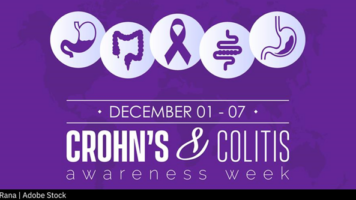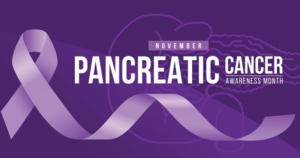Monthly Newsletter
Pancreatic Cancer Awareness Month Highlights Promising Treatments
November 2023
Pancreatic Cancer Awareness Month Highlights Promising Treatments
November is Pancreatic Cancer Awareness Month, an important time to highlight the potential of cell and gene therapy science to transform how patients with pancreatic cancer are treated.
Pancreatic cancer is the third most common cause of cancer death in the United States and the 7th deadliest cancer worldwide. According to the American Cancer Society, approximately 64,000 people in the United States will be diagnosed with pancreatic cancer in 2023. Approximately 51,000 people in the U.S. die of this disease each year.
Some of the risk factors that contribute to the prevalence of pancreatic cancer include: smoking, obesity, personal history of diabetes and family history of pancreatic cancer or pancreatitis.
Pancreatic cancer is a silent killer, as its symptoms are so vague during early stages so that most people are not diagnosed until the disease has advanced beyond the stage where surgical intervention is possible. Easily detectable signs or symptoms usually are not present during the early stages of the disease. Even when present, they may be similar to symptoms of other conditions like stomach or back pain, unexplained weight loss, loss of appetite or fatigue.
I know all too well the devastating impacts of this deadly disease. My husband and I said goodbye to our dear friend of more than three decades who passed away this Summer from pancreatic cancer. We miss Fred Hiestand and are reminded every day of the loss of his friendship, stories of his maverick career, his incredible intellect, and unique view of the world. There are too many others like Fred who have lost their lives too quickly because of this evasive disease.
The primary goals of Pancreatic Cancer Awareness Month are to spread awareness about the disease and current scientific breakthroughs to bring new therapies to patients.
- A new BioNTech mRNA pancreatic cancer vaccine trial will start its next phase after initial successful results in clinical trials. The National Institutes of Health funded trialwill investigate whether this personalized therapeutic vaccine reduces the risk of pancreatic cancer returning after the tumor is removed by surgery.
- Researchers have also uncovered how pancreatic cancer cells are able to make nutrients they need to grow into deadly tumors. This discovery could hold the key to starving these tumors and specifically target pancreatic cancer cells without harming the rest of the body. Most notably, a drug is already on the market to eliminate the lethal cells.
- With one in four people diagnosed with pancreatic cancer after being diagnosed with diabetes, new research is being focused on discovering pancreatic cancer biomarkers in people who have diabetes in order to earlier detect and treat pancreatic cancer
For more information about pancreatic cancer visit the National Pancreatic Cancer Foundation or the Pancreatic Cancer Action Network.
November is Alzheimer’s Awareness Month
November is Alzheimer’s Awareness Month, a time to heighten awareness about Alzheimer’s disease, learn more about prevention and treatment, and show support for the more than 6.7 million Americans living with it.
Alzheimer’s disease, the leading cause of dementia worldwide, is an irreversible progressive neurodegenerative disorder characterized by cognitive impairment, memory loss and functional disability. Alzheimer’s occurs when there is an excessive accumulation of proteins in the brain which form plaques around brain cells that lead to a decline in neurotransmitters, which are key to proper brain functioning.
A recent report released by the Alzheimer’s Association confirms over 720,000 Californians currently live with Alzheimer’s disease. That number will increase to 840,000 by the year 2025.
While Alzheimer’s has no cure, there are several promising treatments aimed at reducing cognitive decline or preventing the disease altogether. Over 140 therapies are being tested in clinical trials for the treatment of Alzheimer’s disease. 78 percent of these drugs are designed to try and slow down how quickly the disease progresses.
- The U.S. Food and Drug Administration (FDA recently gave full approval for, lecanemab-irmb (Leqembi®) which was proven to slow the cognitive decline in people with the disease by 27 percent during clinical trials. This is the first traditional approval of an Alzheimer’s treatment that changes the underlying course of the disease.
- Aducanumab (Aduhelm®) also received FDA approval as a treatment for Alzheimer’s disease from which removes beta-amyloid from the brain reduces cognitive and functional decline in people living with early Alzheimer’s.
- Recent clinical trials of donanemab, made by Eli Lily, showed that the treatment successfully leads to the removal of amyloid from the brain and can slow down quickly memory and thinking skills get worse. It slowed how fast memory and thinking get worse by more than 20 percent.
- New research suggests that individuals who had received at least one flu shot had a 40% lower chance of developing Alzheimer’s compared to those who had not received any vaccination. Researchers are now looking at the possibility of protecting a person from developing dementia through a vaccine.
For more information visit the Alzheimer’s Association or the Alzheimer’s Foundation of America.
Stay informed on the latest news and trends on the economic and health benefits of this industry by visiting CABiotech.org
If you have any questions about hosting informational briefings for your colleagues serving in the legislature, contact California Biotechnology Foundation Executive Director Patty Cooper at (916)764-2434 or [email protected].




